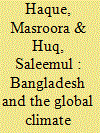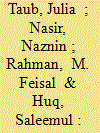|
|
|
Sort Order |
|
|
|
Items / Page
|
|
|
|
|
|
|
| Srl | Item |
| 1 |
ID:
138176


|
|
|
|
|
| Summary/Abstract |
The yearly international climate change negotiations, also known as Conferences of Parties (COPs), are large and formidable affairs. Under the aegis of the United Nations Framework Convention on Climate Change (UNFCCC), government ministers, bureaucrats, and other delegates from developed and developing countries come to hash out compromises. Civil society organizations, activists, researchers, scientists, UN officials, journalists, students, and private-sector leaders come from all over the world to protest, network, and exchange ideas.
|
|
|
|
|
|
|
|
|
|
|
|
|
|
|
|
| 2 |
ID:
151002


|
|
|
|
|
| Summary/Abstract |
The issue of loss and damage has historically been politically contentious, with developed countries being afraid of being held responsible, and developing countries demanding some form of compensation for being disproportionately impacted by climate change-induced loss and damage. After much debate between developed and developing countries, the Paris Agreement took the middle road between the varying outcomes envisioned by developed and developing countries. The Agreement recognised the most vital demands of the developing countries to incorporate loss and damage as an independent pillar of the UNFCCC process and made the Warsaw International Mechanism permanent. Considering the discomfort among the developed block, the language of the Agreement was general and non-binding in character, overtly excluding the possibility of liability or compensation under loss and damage, which many have been described as a failure for vulnerable countries. Thus, the major challenge for the COP22 will be to expedite the discussion around financing and legal responsibility for loss and damage. This article discusses the road towards the Paris Agreement in light of the history of negotiations on loss and damage under the UNFCCC and aims to understand how it will impact the future of loss and damage.
|
|
|
|
|
|
|
|
|
|
|
|
|
|
|
|
|
|
|
|
|